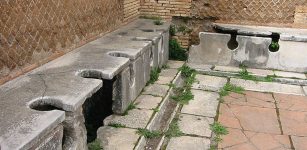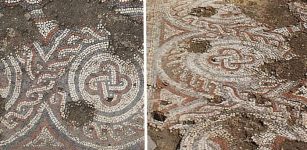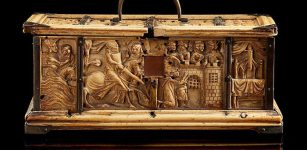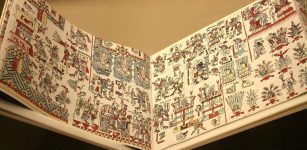Defixiones: Ancient Roman Curse Tablets Became Big Business
Ellen Lloyd - AncientPages.com - For over 700 years, ancient Romans bought a variety of defixiones – curse tablets to cast evil spells on anyone and anything.
Ancient Romans believed in the power of spells and thought these magical curse tablets would help them destroy their enemies. But you have to act quickly. It was vital to buy the curse tablet before your enemy came up with the same idea.
The Roman curse tablets from Bath Britain's earliest prayers. One of the 130 Bath curse tablets. The inscription in British Latin translates as: "May he who carried off Vilbia from me become liquid as the water. May she who so obscenely devoured her become dumb". Image credit: Mike Peel - (www.mikepeel.net) - CC BY-SA 4.0
The Ancient Business Of Buying Curse Tablets
The defixiones, curse tablets, were made of lead or lead alloys. It was a material that would endure harsh climatic elements and survive longer. It was less costly than the papyrus and wax alternatives. Sometimes limestone, ceramics, and even semi-precious stones were used to convey the desired ancient messages.
According to Pliny, the Elder (23 AD - 79 AD), a Roman scholar, Gaius Plinius Secundus, knew ancient Romans deeply feared curses.
Archaeologists have unearthed more than 1500 ancient curse tablets. Most of them were found in Italy, often near Rome. Several curse tablets have also been unearthed in Roman Britain. People bought curse tablets from "professional" magicians, who had ready curse tables in their stocks. All the customer had to do was state the victim's name. This name was quickly inscribed on the defixiones.
The curse tablets conveyed messages to influential gods and spirits, usually asking them for victory over an enemy by binding them up in terrible trouble.
Ancient Curse Tablets Were Often Placed In Graves
Defixiones were laid as close to the victim as possible.
Roman curse tablet with voces mysticae in Greek. The name of the target, Caius Iulius Viator, was added in Latin. Found in Tongeren (Belgium), 70-100 CE, Gallo-Roman Museum (Tongeren). Image credit: GRM Tongeren - CC0
For instance, a curse on a chariot racer would best be concealed in the stadium; the one targeting a prominent bureaucrat would need to be buried near his government office. It happened that they were also placed inside graves.
Ancient Romans believed that people who died early were doomed to wander around the Earth as ghosts. By placing defixiones inside graves, the curses could help the deceased get peace if the spirit helped execute the curse. The fact that it was strictly prohibited to open graves did not stop people who quietly sneaked in at night at placed a curse tablet inside the tomb.
Everyone Was Casting Spells And Cursed Others
There was no limit to the number of curses in people's beliefs. Many unearthed defixiones showed signs of people's selfishness and greed, revenge, justice, sport, business, love, and sex. Rivals in sports and business, for example, were cursed to fail.
Curse Tablets Were Forbidden Several Times
The ancient curse tablets became extremely popular and were undoubtedly a big business. The Roman Emperor made several attempts to forbid people from using them. The punishment for using defixiones was crucifixion or killing by wild animals. Nevertheless, no punishment could frighten ancient Romans, who kept buying the curse tablets and using them against their enemies.
Early Christians also used curse tablets for a while before the Church successfully managed to stop the spread and use of the defixiones.
Updated on January 15, 2024
Written by Ellen Lloyd – AncientPages.com
Copyright © AncientPages.com. All rights reserved. This material may not be published, broadcast, rewritten or redistributed in whole or part without the express written permission of AncientPages.com
Expand for referencesMore From Ancient Pages
-
 Merovingian Dynasty Of Long Haired Kings
Featured Stories | Jan 18, 2019
Merovingian Dynasty Of Long Haired Kings
Featured Stories | Jan 18, 2019 -
 Was The Discovery Of Biblical Abel’s Giant Grave In Syria Covered-Up?
Biblical Mysteries | Oct 28, 2014
Was The Discovery Of Biblical Abel’s Giant Grave In Syria Covered-Up?
Biblical Mysteries | Oct 28, 2014 -
 ‘Impossible’ Ancient Traces Of Humans – No, We Are Not The First
Artifacts | May 16, 2020
‘Impossible’ Ancient Traces Of Humans – No, We Are Not The First
Artifacts | May 16, 2020 -
 Anasazi: Sophisticated Civilization That Disappeared Or Evolved Into American Indians Of Southwest
Civilizations | Dec 3, 2016
Anasazi: Sophisticated Civilization That Disappeared Or Evolved Into American Indians Of Southwest
Civilizations | Dec 3, 2016 -
 The Romans Spread Parasites – Their Hygienic Innovations Gave No Health Benefit
Archaeology | Jan 9, 2016
The Romans Spread Parasites – Their Hygienic Innovations Gave No Health Benefit
Archaeology | Jan 9, 2016 -
 Dinosaurs Were The First To Take The Perspectives Of Others
Fossils | Jun 1, 2023
Dinosaurs Were The First To Take The Perspectives Of Others
Fossils | Jun 1, 2023 -
 Early Christian Crypt Unearthed In Zaldapa Fortress, Bulgaria
News | Sep 7, 2015
Early Christian Crypt Unearthed In Zaldapa Fortress, Bulgaria
News | Sep 7, 2015 -
 Ancient Egyptian Women Had Equal Rights As Men – Egyptian Cosmology And Goddess Maat Reveal Why
Ancient History Facts | Dec 18, 2017
Ancient Egyptian Women Had Equal Rights As Men – Egyptian Cosmology And Goddess Maat Reveal Why
Ancient History Facts | Dec 18, 2017 -
 First 5th Century Mosaic Found Near Cirencester Once The Second-Largest Roman-British Town In England
Archaeology | Dec 16, 2020
First 5th Century Mosaic Found Near Cirencester Once The Second-Largest Roman-British Town In England
Archaeology | Dec 16, 2020 -
 Nefertiti Was A Powerful Queen But Never A Pharaoh – Researcher Says
Archaeology | Jan 23, 2018
Nefertiti Was A Powerful Queen But Never A Pharaoh – Researcher Says
Archaeology | Jan 23, 2018 -
 Legendary Sea Monster Exists: Icelandic Government Commission Says
Featured Stories | Sep 27, 2014
Legendary Sea Monster Exists: Icelandic Government Commission Says
Featured Stories | Sep 27, 2014 -
 Pamola: Mighty Thunderbird In Myths Of Penobscot People Of Maine
Featured Stories | Apr 25, 2019
Pamola: Mighty Thunderbird In Myths Of Penobscot People Of Maine
Featured Stories | Apr 25, 2019 -
 Strange Ancient And Medieval Encounters With Unusual Beings Reported And Documented
Featured Stories | Jan 15, 2024
Strange Ancient And Medieval Encounters With Unusual Beings Reported And Documented
Featured Stories | Jan 15, 2024 -
 Home Of Jesus’ Apostles Found In The Lost Biblical Town Bethsaida
Archaeology | Aug 10, 2017
Home Of Jesus’ Apostles Found In The Lost Biblical Town Bethsaida
Archaeology | Aug 10, 2017 -
 Mayong – Mysterious Ancient Land Of Black Magic In India
Featured Stories | Mar 7, 2019
Mayong – Mysterious Ancient Land Of Black Magic In India
Featured Stories | Mar 7, 2019 -
 Pandavleni Buddhist Caves: Sculptures, Inscriptions And Sophisticated Water Management System
Civilizations | Dec 8, 2016
Pandavleni Buddhist Caves: Sculptures, Inscriptions And Sophisticated Water Management System
Civilizations | Dec 8, 2016 -
 Legacy Of The Iconic Sycamore Gap Tree – Historical Landmark At Hadrian’s Wall
Featured Stories | Mar 28, 2024
Legacy Of The Iconic Sycamore Gap Tree – Historical Landmark At Hadrian’s Wall
Featured Stories | Mar 28, 2024 -
 Humans Spread The Black Death – Not Rats – Scientists Say
Archaeology | Feb 7, 2018
Humans Spread The Black Death – Not Rats – Scientists Say
Archaeology | Feb 7, 2018 -
 Extremely Rare 700-Year-Old French Gothic Ivory Casket At Risk Of Leaving The UK
Archaeology | Dec 7, 2022
Extremely Rare 700-Year-Old French Gothic Ivory Casket At Risk Of Leaving The UK
Archaeology | Dec 7, 2022 -
 Preserved Mixtec Codices: Codex Zouche-Nuttall – Beautiful ‘Folding Screen Of Historical Events Of Mixtec People Of Oaxaca
Artifacts | Dec 3, 2017
Preserved Mixtec Codices: Codex Zouche-Nuttall – Beautiful ‘Folding Screen Of Historical Events Of Mixtec People Of Oaxaca
Artifacts | Dec 3, 2017


